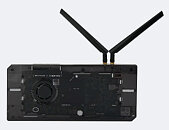Framework Dives Deep into Desktop's Power Supply Design - Collaborated with FSP
We're close to the finish line on Framework Desktop development. We're now at the end of the DVT2 phase where we complete validation and finalize firmware and drivers. With that, we're continuing our deep dive series, this time digging into the semi-custom 400 W Power Supply we integrated into the product. This may sound mundane, but it's one of the more complex parts of the product. To align to our product philosophy, we used a standard FlexATX form factor. That means both that you can bring your own compatible power supply or re-use the one we designed in the future with any other ATX-compatible system. If you're bringing your own, make sure to pick one that can handle at least 32.5 A on the 12 V rail.
Although the "peak" power demand of the AMD Ryzen AI Max processor is 140 W, it can actually pull hundreds of watts in millisecond-level bursts. Because there is no battery in the Framework Desktop to absorb this, we sized up the Power Supply to handle it and maximize performance. We worked with FSP, one of the biggest power supply makers in Taiwan and the manufacturer behind many other brands, to build a compact, high-efficiency, quiet design. We actually started with one of their higher wattage off the shelf power supplies, down-rated it to 400 W to focus on efficiency while allowing higher peak load, and customized it from there. We modified a few areas to optimize it for the core Framework Desktop use cases.
Although the "peak" power demand of the AMD Ryzen AI Max processor is 140 W, it can actually pull hundreds of watts in millisecond-level bursts. Because there is no battery in the Framework Desktop to absorb this, we sized up the Power Supply to handle it and maximize performance. We worked with FSP, one of the biggest power supply makers in Taiwan and the manufacturer behind many other brands, to build a compact, high-efficiency, quiet design. We actually started with one of their higher wattage off the shelf power supplies, down-rated it to 400 W to focus on efficiency while allowing higher peak load, and customized it from there. We modified a few areas to optimize it for the core Framework Desktop use cases.











































































